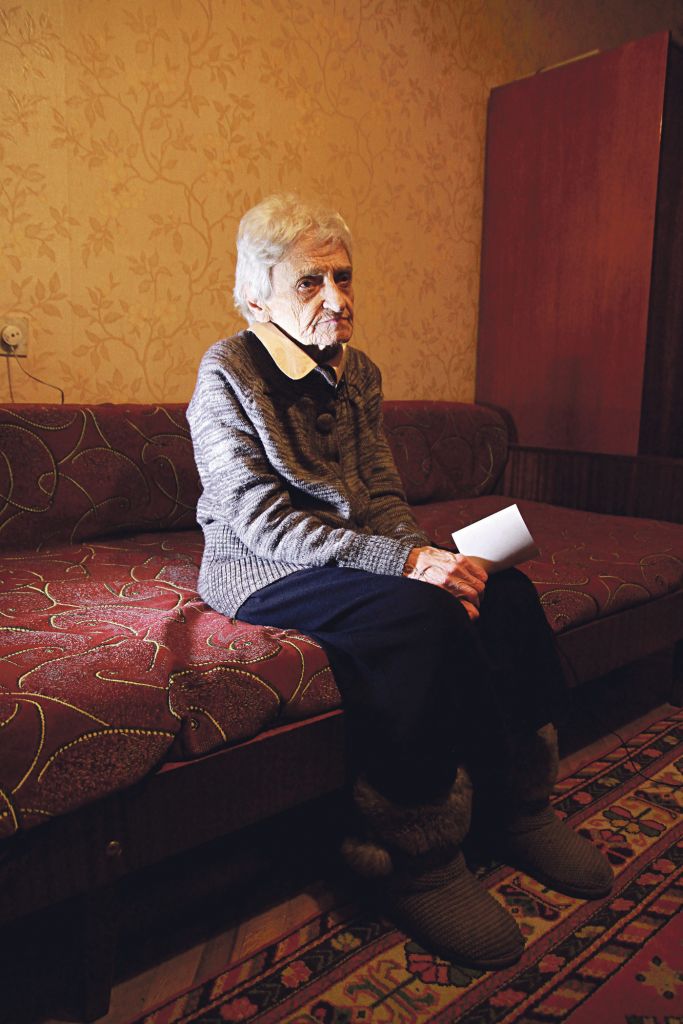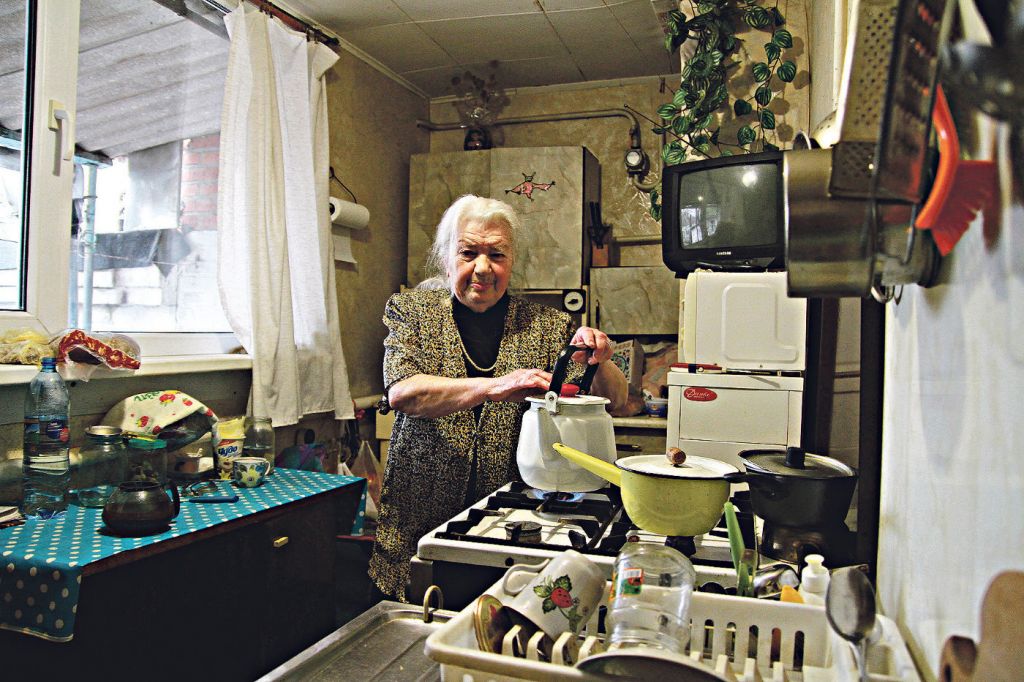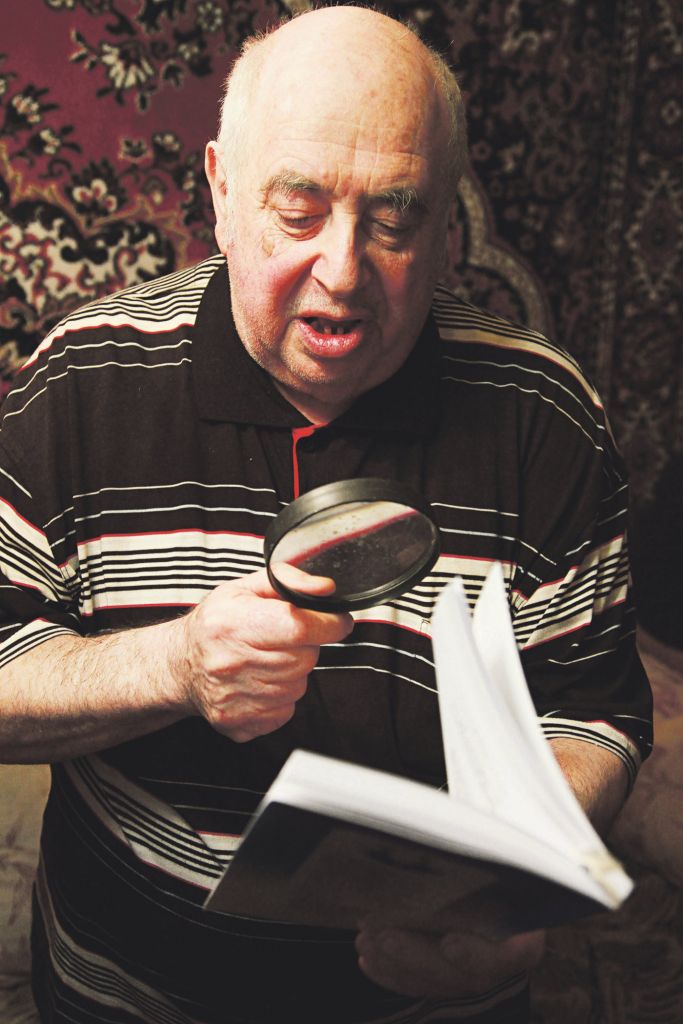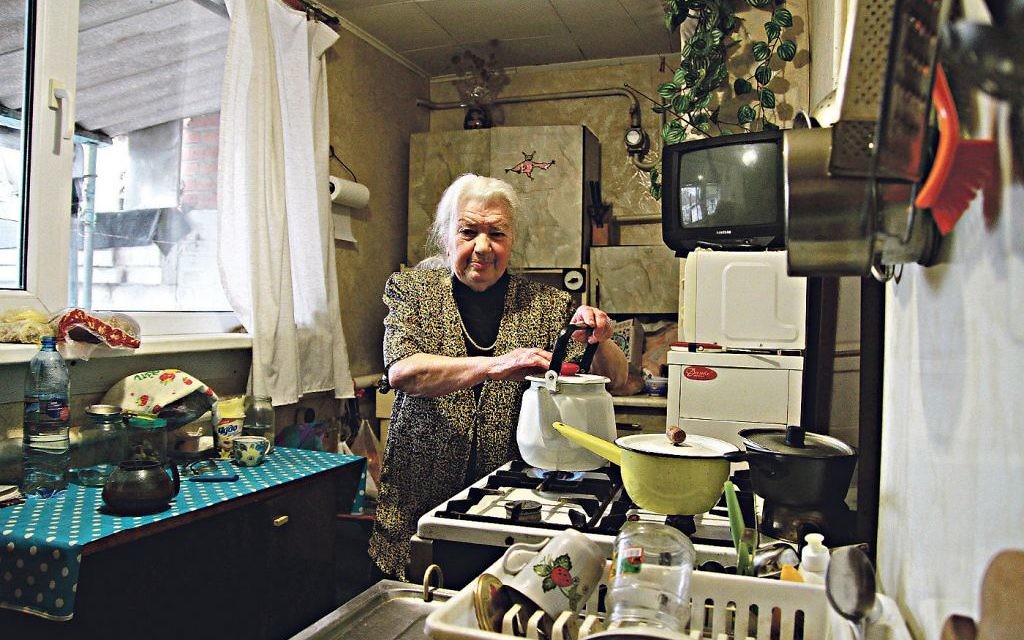Special Report: A bold new vision to help Ukraine’s elderly Jews
Stephen Oryszczuk joins a World Jewish Relief film crew in Ukraine to search for a face to front its latest Pesach appeal
World Jewish Relief is looking for a star. Its crew – comprising videographer, photographer, marketing man, local coordinator, translator and communications director – is looking for an elderly Jew who will best front this year’s Pesach Appeal for eye-care in Ukraine. In their search for just the right face, I’ve tagged along for the ride.
Who to choose? We meet and film Vladimir, Rimma, Anya, Viktor, Vyacheslav and others, all either in need of or in recent receipt of eye-care funded by the charity via Ukrainian partner Hesed. Usually it’s an operation for something like cataracts or glaucoma.
The cameras seem to be settling on those who are more emotive, more able to describe the impact that restored sight has or will have.
Get The Jewish News Daily Edition by email and never miss our top stories Free Sign Up
To the lens and to the UK audience, they are beckoned to tell their story. Bearing in mind they’re Jewish, some tell and tell and tell. Others keep their answers short and sweet. Some just keep their answers short.
Among the latter, and seemingly dismissed by the WJR crowd, is my personal favourite: Zorya. I like her all the more because she is no good at describing her woes. There’s a reason for that.

A little over four foot tall, Zorya nevertheless holds her head high. At 86, she shakes like a leaf and looks a bit like Yoda, with hands more vein than bone. The very image of brittle frailty, she lives in a tiny fourth-floor apartment with faded peeling wallpaper charred around the sockets, her main room bathed in tinged lighting that softens her face, itself a mass of deep lines careering over her features like a cartographer’s canyons. I’ve never met her, yet she seems familiar.
I recognise Zorya as the epitome of an elderly Ukrainian generation I came to know and love during a year spent living here in 2012. Growing up in the USSR under Stalin and Khrushchev, their two unfailing attributes are personal pride and a wariness of others. Both are ingrained.
Stoic and self-reliant, they are the last people in the world to ask for help, but among those most in need of it.
Zorya is not an American day-time TV host, as the London-based WJR bods seem to want, and she does not pour out her angst all over her ageing carpet, or gush with gratitude for the help she received for her recent operation, which means she can now see again (although quietly and without dwelling, she does say “a thousand times thank you” to the camera, which I consider ‘gratitude with grace’).
This is not a gushing people, nor a gushing generation. They are in many ways survivors, not just of the Nazis but of circumstance, of communism, of rationing and of suppression.
Stoic and self-reliant, they are the last people in the world to ask for help, but among those most in need of it. They were poor even before the fighting in the east with Russian-backed rebels caused inflation to increase prices fivefold.

Technically, healthcare in Ukraine is free, so why do they need the charity’s help? When I put this to the Hesed team in Kharkiv, 40 miles from the Russian border, working from the JDC Jewish community centre in this central industrial city, they sigh.
Yes, it’s meant to be free, but this is Ukraine, where corruption is endemic and doctors are paid a pittance. “You’re told for free that you need an operation, then you’re asked: first, buy the doctors’ equipment; second, pay a mandatory ‘charitable donation’ to the clinic for your stay; third, pay another clinic for a medical investigation to determine what surgery is needed; fourth, pay the doctors, nurses and anaesthetists.”
They are in many ways survivors, not just of the Nazis but of circumstance, of communism, of rationing and of suppression.
This is all “cash in an envelope”. When all is said and done, it costs almost as much to have “free” state healthcare as it does to go private. And there’s only one state hospital in Kharkiv with a good reputation for eyecare, so the waiting list is huge. “That’s why we use a private clinic… It’s better to pay once, officially, and get seen quickly.”
Back to Zorya and her apartment. It’s the size of a Bishops Avenue broom cupboard, not even big enough for eight people plus cameras. She asks a tall videographer to change one of three light bulbs before sitting down to answer questions, eyes now sharp as pins, her gaze once again as piercing as it should be.
A once-active Hesed volunteer herself, she had the operation recently, after her eyesight reached -15, rendering her virtually blind. The interviewer checks his questions. She waits.
“What’s your daily routine?” he asks, finally. “I wake up and call my grandchildren,” she says. “What couldn’t you do when you couldn’t see?” She thinks. “I couldn’t watch TV.”
On we go.
No, her renewed eyesight doesn’t mean she’ll be painting watercolours, but she will be able to read again. No, she wasn’t house-bound before the op, but she did have to stick to the paths she knew, and to daylight, and could get downstairs and over the road only with someone’s help. “Now I can see people across the street,” she says with a rare and fleeting smile.
You can almost feel the collective exhalation and deflation of the WJR team who are looking for answers that will get people back home reaching for their wallets and giving.
Zorya isn’t doing it. She’s relaying neither despair, misery and vulnerability at having next to no vision, nor is she describing how the gift of light at this time of year has renewed her faith in God and humanity and all things wondrous.
Others we see, like the effervescent Anya or poet Vladimir, who’s 73 but tells the women he’s only 72, are more personable, relatable and able to relay the difficulties of not being able to see. Zorya, by contrast, is not what you would call ‘charity appeal’ box-office.

But to me she’s exactly why people should give, because she’s the most real. She could be anyone’s grandmother. On paper, someone saying they can’t watch telly hardly wrenches the heart, but if you’re 86 with no money, TV and reading are immense.
If you have less, what you have means more. Just as recognising your neighbours from across the road is a big deal when you’re 86, because they’re often all you meet.
You can almost feel the collective exhalation and deflation of the WJR team who are looking for answers that will get people back home reaching for their wallets and giving.
Just as at 86 being able to see the world outside your window gives you a world outside your window. And as you venture outside, aged 86, not seeing where you’re going in this land of pot-holes, high kerbs, bad lighting and worse drivers can mean more than broken bones.
Zorya was never going to tell the film crew any of that. She was never going to say she felt nervous or vulnerable, or that she could never have afforded the 14,000 hrivna (about £370) operation because her monthly pension is only 1,500 hrivna (about £40 – average for Ukraine) and banks don’t loan people like her money. Pride and wariness of strangers, remember.
Hesed says there are more than 100 other elderly Jews just like Zorya in urgent need of eye-care in Kharkiv, a city of 40,000 Jews. A standard operation, otherwise known as the gift of sight, costs about £370 per eye, before the cost of aftercare such as glasses.
Back in Zorya’s apartment, the interview is over. Zorya looks pleased, but the WJR interviewer appears lacklustre at not having got the killer line, the crowning sentiment to which the charity can pin its Pesach campaign.
As the cameras are packed, as people bid farewell and file out, Zorya asks the tall videographer to replace the bulb he put in earlier with the dimmer original, reducing the lighting still further. “It saves money,” she tells him, quietly.
He doesn’t make a thing of it, but when he translates it afterwards, he’s visibly moved.
The cameras have just missed the bit that would have made almost everyone give.

Thank you for helping to make Jewish News the leading source of news and opinion for the UK Jewish community. Today we're asking for your invaluable help to continue putting our community first in everything we do.
For as little as £5 a month you can help sustain the vital work we do in celebrating and standing up for Jewish life in Britain.
Jewish News holds our community together and keeps us connected. Like a synagogue, it’s where people turn to feel part of something bigger. It also proudly shows the rest of Britain the vibrancy and rich culture of modern Jewish life.
You can make a quick and easy one-off or monthly contribution of £5, £10, £20 or any other sum you’re comfortable with.
100% of your donation will help us continue celebrating our community, in all its dynamic diversity...
Engaging
Being a community platform means so much more than producing a newspaper and website. One of our proudest roles is media partnering with our invaluable charities to amplify the outstanding work they do to help us all.
Celebrating
There’s no shortage of oys in the world but Jewish News takes every opportunity to celebrate the joys too, through projects like Night of Heroes, 40 Under 40 and other compelling countdowns that make the community kvell with pride.
Pioneering
In the first collaboration between media outlets from different faiths, Jewish News worked with British Muslim TV and Church Times to produce a list of young activists leading the way on interfaith understanding.
Campaigning
Royal Mail issued a stamp honouring Holocaust hero Sir Nicholas Winton after a Jewish News campaign attracted more than 100,000 backers. Jewish Newsalso produces special editions of the paper highlighting pressing issues including mental health and Holocaust remembrance.
Easy access
In an age when news is readily accessible, Jewish News provides high-quality content free online and offline, removing any financial barriers to connecting people.
Voice of our community to wider society
The Jewish News team regularly appears on TV, radio and on the pages of the national press to comment on stories about the Jewish community. Easy access to the paper on the streets of London also means Jewish News provides an invaluable window into the community for the country at large.
We hope you agree all this is worth preserving.
-
By Laurent Vaughan - Senior Associate (Bishop & Sewell Solicitors)
-
By Laurent Vaughan - Senior Associate (Bishop & Sewell Solicitors)
-
By Laurent Vaughan - Senior Associate (Bishop & Sewell Solicitors)
-
By Laurent Vaughan - Senior Associate (Bishop & Sewell Solicitors)






















